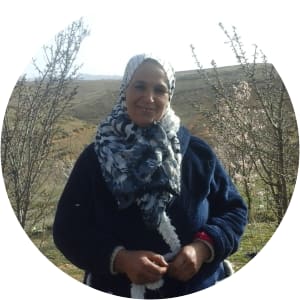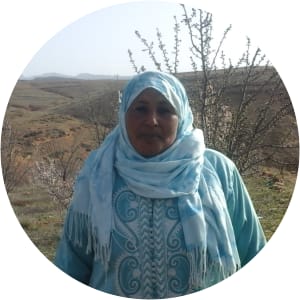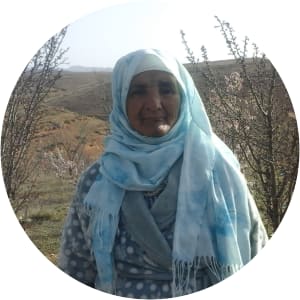
Fatime Ashoor serves as the head of the cooperative. She was born in 1971, in the town of Imouzzer Marmoucha. She is now the mother to three sons, who have special needs. Her husband is now retired and tends to their children.
After completing primary school, her father denied her wishes of attending military school in Muhammadiyah, despite her gifted abilities. He instead wished for her to join a vocational training center. During this time, she also learned how to weave from her mother.
The cooperative allows her to have a creative outlet. It also enables her to empower others in her same living conditions. She hopes one day that their products become popular enough that her, and her other female colleagues, can build a large cooperative headquarters. So that they may embrace all the tribesmen who were not fortunate enough to complete their studies, thus preserving their cultural heritage from extinction.

Fatimea Al-Saeedi currently serves as the Vice President to the cooperative. She was born in 1972 in the city of Temadhit. She got married in Imouzzer and is the mother of four sons. Her oldest son joined the military corps. Her oldest daughter is recently married. Her two remaining children are now attending middle school.
She learned to weave at the young age of nine years old from her mother. As she was unable to attend school, due to family circumstances.
The cooperative is an important opportunity for her to exchange ideas with other artisans and earn an income. Her wish is to earn a respectable income that enables her to teach her two sons to reach for their goals and attend the best schooling possible, especially since she knows what it is like to be deprived of learning. She hopes her products, along with products from the cooperative will be able to find homes, both nationally and internationally.

Fatima Billion is a counselor, born in 1949. She is now married and the mother to eight children. Her and her family live in extreme poverty. She joined the cooperative in order to earn a respectable income, as her husband’s income is insufficient for their large family. She dreams of the day where her family will be financially stable. Despite her old age, fabric to her is a main source of daily strength. She loves all types of textiles, including Nabanian products, especially the mats that are nearly extinct. Her hope is that her products will become popular with many customers, whether inside or outside of Morocco.
Pile Knot documented the process of making this product to provide
transparency behind who made this and show the work that went into making such a
beautiful product.














